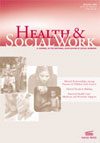 Stroke is a leading cause of long-term disability in the United States, and has been estimated to affect four out of five families. The aftermath of stroke can devastate both survivors and their spouses. Survivors of stroke often come to rely on informal caregivers, such as partners or spouses, once they return home from hospitals or care facilities. This reliance can be disruptive, even onerous for the spouse. Researchers have studied the effects of stroke on survivors and their spouses, but to date, few have focused on how couples might experience the effects of stroke differently based on the ages of the partners, and on how many years the partners have been together.
Stroke is a leading cause of long-term disability in the United States, and has been estimated to affect four out of five families. The aftermath of stroke can devastate both survivors and their spouses. Survivors of stroke often come to rely on informal caregivers, such as partners or spouses, once they return home from hospitals or care facilities. This reliance can be disruptive, even onerous for the spouse. Researchers have studied the effects of stroke on survivors and their spouses, but to date, few have focused on how couples might experience the effects of stroke differently based on the ages of the partners, and on how many years the partners have been together.
In a recent issue of the NASW Press published journal Health and Social Work, Michael J. McCarthy, PhD and Elizabeth Bauer, MSW, LSW, detail their findings from a study of a purposive sample of stroke survivors and their partners. They relied on the theoretical framework of “biographical disruption” to analyze the findings of their interviews with 31 couples. The “normal” life-course of couples (young couples, to couples with young children, to couples with adolescents, to couples at midlife, then in later life) describes a narrative arc most people use to assess their lives. Stroke imposes a biographical disruption, causing couples to reassess their lives; it is a sudden event that is “off-time” with whatever age the couples are in, and disrupts the life-course.
McCarthy and Bauer interviewed the couples about their lives after the stroke. They looked at the issues the couples raised, and arrived at four primary themes:
- Practical and emotional challenges
- Relationship challenges
- Unexpected changes to the couples’ anticipated life course
- Mobilization of emotional and relationship resources
They then assessed looked at how these themes were viewed by the couples, organizing them according to the differences in the couples’ experiences by age, and the couples’ experiences by relationship duration. As a result, for instance, the researchers found that while older couples were less emotionally strained by the stroke, younger couples faced strains from such issues as child care needs and feeling isolated from the broader world. Younger couples were more apt to mention pride in the progress the stroke survivor had made, while older couples were more likely to assess the limits of their mortality. The researchers also noted that the longer the relationship had been going on prior to the stroke, the more likely it offered an emotional and financial buffer for the survivor and the partner.
The article details how this information can be useful to social workers on a macro, mezzo, and micro level. The authors call for further research, especially given the limited sample size, and the lack of diversity among the couples interviewed for the study.



